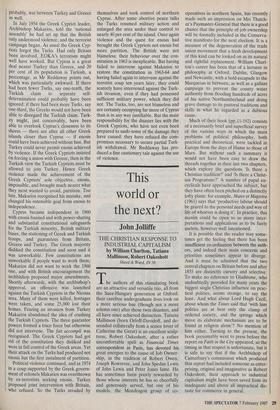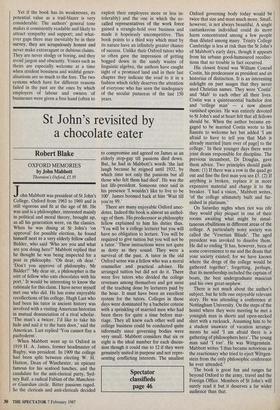This world or the next?
John Jolliffe
THE CHRISTIAN RESPONSE TO INDUSTRIAL CAPITALISM by William Charlton, Tatiana Mallinson, Robert Oakeshott
Sheed & Ward, £9.50
The authors of this stimulating book are an attractive and versatile trio, all from the Suez-Hungary generation at Oxford: their carefree undergraduate lives took on a more serious hue (though not a more solemn one) after those twin disasters, and all have since achieved distinction. Tatiana Mallinson (born Orloff-Davidoff, and de- scended collaterally from a senior lover of Catherine the Great) is an excellent sculp- tress; Robert Oakeshott, after a rather uncomfortable spell as Financial Times correspondent in Paris, has devoted his great energies to the cause of Job Owner- ship, in the tradition of Robert Owen, Joseph Rowntree, and John Spedan Lewis of John Lewis and Peter Jones fame. He has sometimes been poorly rewarded by those whose interests he has so cheerfully and generously served, but one of his models, the Mondragon group of co- operatives in northern Spain, has recently made such an impression on Mrs Thatch- er's Paymaster-General that there is a good chance that the principle of job ownership will be formally included in the Conserva- tive manifesto for the next election. It is a measure of the degeneration of the trade union movement that a fresh development of this kind can be looked on as its natural and rightful replacement. William Charl- ton's career has been that of a lecturer in philosophy at Oxford, Dublin, Glasgow and Newcastle, with a bold escapade to the Marquesas in between, as well as a gallant campaign to prevent the county water authority from flooding hundreds of acres of his native Northumberland and doing grave damage to its pastoral traditions and skills in what he regarded as a dubious cause.
Much of their book (pp.11-192) consists of a necessarily brief and superficial survey of the various ways in which the main problems of political philosophy, both practical and theoretical, were tackled in Europe from the days of Hume to those of Marx. But without such a summary it would not have been easy to draw the threads together in their last two chapters, which explore the questions 'Is there a Christian tradition?' and 'Is there a Christ- ian Programme?' A number of papal en- cyclicals have approached the subject, but they have often been pitched on a distinctly lofty plane: for example, Mater et Magistra (1961) says that 'productive labour should be geared to the personal needs and way of life of whoever is doing it'. In practice, this maxim could be open to so many inter- pretations and applications as to be fairly useless, however well intentioned.
It is possible that the reader may some- times get the feeling that there has been insufficient co-ordination between the auth- ors, and indeed their main concerns and priorities sometimes appear to diverge. And it must be admitted that the two central chapters on Britain before and after 1855 are distinctly cursory and selective. To make no reference to Gladstone, who undoubtedly provided for many years the biggest single Christian influence on prac- tical politics, seems strange, to say the least. And what about Lord Hugh Cecil, about whom the Times said that 'with him politics are at best only the clamp of ordered society, and the springs which move its elaborate mechanism are to be found in religion alone'? No mention of him either. Turning to the present, the book presumably went to press before the report on Faith in the City appeared, so the timing in that respect is unfortunate, but it is safe to say that if the Archbishop of Canterbury's commission which produced that report had included someone as enter- prising, original and imaginative as Robert Oakeshott, their approach to industrial capitalism might have been saved from its inadequate and above all impractical dis- taste for commerce in general. Yet if the book has its weaknesses, its potential value as a trail-blazer is very considerable. The authors' general tone makes it consistently readable and likely to attract sympathy and support; and what- ever gaps there may inevitably be in their survey, they are scrupulously honest and never make extravagant or dubious claims. They are never stodgy or boring, and they avoid jargon and obscurity. Voices such as theirs are especially welcome at a time when strident bossiness and wishful gener- alisations are so much to the fore. The two systems which have for different reasons failed in the past are the ones by which employers of labour and owners of businesses were given a free hand (often to exploit their employees more or less in- tolerably) and the one in which the so- called representatives of the work force gained a strangle-hold over business and made it hopelessly uncompetitive. This book points to a third way which must by its nature have an infinitely greater chance of success. Unlike their Oxford tutors who so often gave the impression of getting bogged down in the sandy wastes of linguistic algebra, the authors have caught sight of a promised land and in their last chapter they indicate the road to it in a fashion which richly deserves the attention of everyone who has seen the inadequacy of the secular panaceas of the last 150 years.



















































 Previous page
Previous page